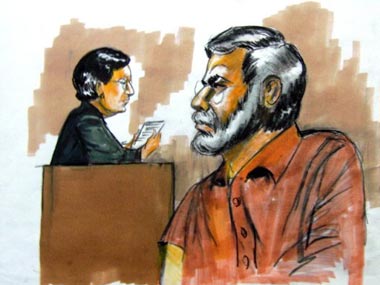By Uttara Choudhury New York: Intense jury deliberations began on Wednesday in the trial of Pakistan-born Chicago businessman Tahawwur Rana, who is accused of helping to plan the gruesome 2008 terror attack on Mumbai. The largely African American 12-member jury consisting of eight women and four men struggled to reach a unanimous verdict behind closed doors. They emerged from their huddle for a few minutes on Wednesday to ask the judge questions about two other Pakistani defendants charged in absentia, and their links to the Lashkar-e-Taiba (LeT) which carried out the Mumbai attacks and Pakistan’s Inter-Services Intelligence (ISI) spy agency. US District Judge Harry Leinenweber told the jurors to rely on the evidence for answers. The jury finally went home late Wednesday without reaching a verdict. [caption id=“attachment_22663” align=“alignleft” width=“380” caption=“Rana is charged with three counts of giving “material support” to terrorists in the Mumbai attacks and faces a possible life sentence if convicted. Vera Sadock/ AFP “]  [/caption] Jury deliberations will resume today (Thursday, 9 June). Swelling international media outlets staked out the federal courthouse in downtown Chicago expecting a verdict to come this week. However, no one is prepared to venture a guess as to how soon the jury will return its verdict. “I never guess on that. The trial is over when all 12 jurors reach a unanimous verdict of either guilty or not guilty or when they determine that they cannot reach a verdict. There is no time limit and it is impossible to predict,” Rana’s defense attorney Charles Swift told Firstpost. “Dr Rana trusts in God and is sustained by his faith and the love and devotion of his family. This is the most difficult time for the lawyers as well. But no matter the result, it was a privilege to work with Pat Blegen and to represent Dr Rana, and I feel good about what we did.” Rana is charged with three counts of giving “material support” to terrorists in the Mumbai attacks and faces a possible life sentence if convicted. During the course of the three-week trial, Headley testified against Rana saying his old friend was an accomplice in the Mumbai attacks. Prosecutors made a 7 September 2009 phone call between Rana and Headley recorded by the FBI the nucleus of closing arguments for the prosecution. In the call, Rana praises the gunmen who carried out the 2008 attacks in Mumbai. “The evidence is quite strong that Rana knew Headley was up to something. It is clear that Rana was in touch with Major Iqbal from the ISI but the defense has argued that he thought Headley was working for the ISI and not a terrorist plot,” Sebastian Rotella — who has authored the book, Pakistan and the Mumbai Attacks — told Public Radio’s Here and Now show. Veteran investigative journalist Rotella, whose book is based on sworn testimony, interrogation reports, and official sources from the US, India, Pakistan, France, Britain and Israel, notes that the Rana trial stands out in recent terrorism trial history. “This is one of the most rich, fascinating, instructive terrorism cases in the past 10 years without question,” Rotella says. “People should pay attention to it.” Headley has described in great detail elements of the ISI who were in collusion with the LeT in planning the Mumbai attacks. The trial also exposes Pakistan’s lack of desire to bring the Mumbai attack masterminds to justice despite the growing evidence. “None of these people appear to have disappeared. People like Major Iqbal, Sajid Mir, and people like Mir whose voices have been caught on tape directing the slaughter in Mumbai in Pakistan are all supposed to be right where they were in the Punjab, in the heartland of Pakistan. Security forces just say they don’t have enough evidence to go after them. That is harder and harder to believe after the evidence provided by the Indian investigative agencies, the FBI, and now comes this trial,” said Rotella. “It is a remarkable moment when we see the limits of the ability or the desire of the Pakistani security forces to go after the people who have been explicitly identified. We have their pictures, voices, their addresses and emails,” added Rotella. Headley testified during the trial that the ISI’s top brass didn’t know about the Mumbai plot, although his main handler was Major Iqbal from the ISI who directed and funded his surveillance trips to Mumbai. Headley also indicated that Iqbal’s boss in the ISI (an unnamed colonel) was very much in the know.
No one is prepared to venture a guess as to how soon the jury will return its verdict.
Advertisement
End of Article
Written by FP Archives
see more


)
)
)
)
)
)
)
)
)



